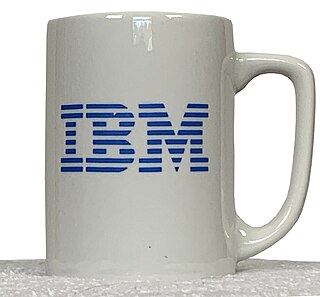
Coca-Cola, or Coke, is a cola soft drink manufactured by the Coca-Cola Company. In 2013, Coke products were sold in over 200 countries and territories worldwide, with consumers drinking more than 1.8 billion company beverage servings each day. Coca-Cola ranked No. 94 in the 2024 Fortune 500 list of the largest United States corporations by revenue. Based on Interbrand's "best global brand" study of 2023, Coca-Cola was the world's sixth most valuable brand.

Pepsi is a carbonated soft drink with a cola flavor, manufactured by PepsiCo. As of 2023, Pepsi is the second most valuable soft drink brand worldwide behind Coca-Cola; the two share a long-standing rivalry in what has been called the "cola wars".
In marketing, corporate branding refers to the practice of promoting the brand name of a corporate entity, as opposed to specific products or services. The activities and thinking that go into corporate branding are different from product and service branding because the scope of a corporate brand is typically much broader. Although corporate branding is a distinct activity from product or service branding, these different forms of branding can, and often do, take place side-by-side within a given corporation. The ways in which corporate brands and other brands interact is known as the corporate brand architecture.
In marketing, brand management begins with an analysis on how a brand is currently perceived in the market, proceeds to planning how the brand should be perceived if it is to achieve its objectives and continues with ensuring that the brand is perceived as planned and secures its objectives. Developing a good relationship with target markets is essential for brand management. Tangible elements of brand management include the product itself; its look, price, and packaging, etc. The intangible elements are the experiences that the target markets share with the brand, and also the relationships they have with the brand. A brand manager would oversee all aspects of the consumer's brand association as well as relationships with members of the supply chain.

New Coke was the unofficial name of a reformulation of the soft drink Coca-Cola, introduced by the Coca-Cola Company in April 1985. It was renamed Coke II in 1990, and discontinued in July 2002.

Tab was a diet cola soft drink produced and distributed by The Coca-Cola Company, introduced in 1963 and discontinued in 2020. The company's first diet drink, Tab was popular among some people throughout the 1960s and 1970s as an alternative to Coca-Cola. Several variations were made, including a number of fruit-flavored, root beer, and ginger ale versions. Caffeine-free and clear variations were released in the late 1980s and early 1990s.

Merchandising is any practice which contributes to the sale of products to a retail consumer. At a retail in-store level, merchandising refers to displaying products that are for sale in a creative way that entices customers to purchase more items or products.

Fresca is a grapefruit-flavored citrus soft drink created by The Coca-Cola Company. Borrowing the word Fresca from Italian, Spanish, and Portuguese, it was introduced in the United States in 1966. Originally a bottled sugar-free diet soda, sugar sweetened versions were introduced in some markets.

A private label, also called a private brand or private-label brand, is a brand owned by a company, offered by that company alongside and competing with brands from other businesses. A private-label brand is almost always offered exclusively by the firm that owns it, although in rare instances the brand is licensed to another company. The term often describes products, but can also encompass services.

The Coca-Cola Company is an American multinational corporation founded in 1892. It manufactures, sells and markets soft drinks including Coca-Cola, other non-alcoholic beverage concentrates and syrups, and alcoholic beverages. Its stock is listed on the New York Stock Exchange and is a component of the DJIA and the S&P 500 and S&P 100 indexes.

Mello Yello is a highly caffeinated, citrus-flavored soft drink produced, distributed and created by the Coca-Cola Company that was introduced on March 12, 1979, to compete with PepsiCo's Mountain Dew.

Coca-Cola Zero Sugar is a diet cola produced by the Coca-Cola Company.
In marketing and consumer behaviour, brand loyalty describes a consumer's persistent positive feelings towards a familiar brand and their dedication to purchasing the brand's products and/or services repeatedly regardless of deficiencies, a competitor's actions, or changes in the market environment. It can also be demonstrated with other behaviors such as positive word-of-mouth advocacy. Corporate brand loyalty is where an individual buys products from the same manufacturer repeatedly and without wavering, rather than from other suppliers. Loyalty implies dedication and should not be confused with habit, its less-than-emotional engagement and commitment. Businesses whose financial and ethical values rest in large part on their brand loyalty are said to use the loyalty business model.
The target audience is the intended audience or readership of a publication, advertisement, or other message catered specifically to the previously intended audience. In marketing and advertising, the target audience is a particular group of consumer within the predetermined target market, identified as the targets or recipients for a particular advertisement or message.

Food marketing is the marketing of food products. It brings together the food producer and the consumer through a chain of marketing activities.
Brand awareness is the extent to which customers are able to recall or recognize a brand under different conditions. Brand awareness is one of two dimensions from brand knowledge, an associative network memory model. It is a key consideration in consumer behavior, advertising management, and brand management. The consumer's ability to recognize or recall a brand is central to purchasing decision-making because purchasing cannot proceed unless a consumer is first aware of a product category and a brand within that category. Awareness does not necessarily mean that the consumer must be able to recall a specific brand name, but they must be able to recall enough distinguishing features for purchasing to proceed. Creating brand awareness is the main step in advertising a new product or bringing back the older brand in light.

A brand is a name, term, design, symbol or any other feature that distinguishes one seller's good or service from those of other sellers. Brands are used in business, marketing, and advertising for recognition and, importantly, to create and store value as brand equity for the object identified, to the benefit of the brand's customers, its owners and shareholders. Brand names are sometimes distinguished from generic or store brands.

Color psychology is the study of colors and hues as a determinant of human behavior. Color influences perceptions that are not obvious, such as the taste of food. Colors have qualities that can cause certain emotions in people. How color influences individuals may differ depending on age, gender, and culture. Although color associations can vary contextually between cultures, color preference is thought to be relatively uniform across gender and race.

Debranding is a marketing strategy to remove the manufacturers name from a product to appear less corporate, or to save on advertising. De-corporatizing is when a company removes its name from its logo for a marketing campaign in an attempt to make themselves appear less corporate and more personal. "Transitioning into generic" is when a company with a well-known brand opts to appear more generic. This means the company will eliminate advertising and reduce prices and debranding in this sense can increase profit margins.
COBRA (consumers' online brand related activities) is a theoretical framework related to understanding consumer's behavioural engagement with brands on social media. COBRA in literature is defined as a “set of brand-related online activities on the part of the consumer that vary in the degree to which the consumer interacts with social media and engages in the consumption, contribution, and creation of media content”. (Schivinski, Christodoulides, & Dabrowski, 2016, p. 66).
















